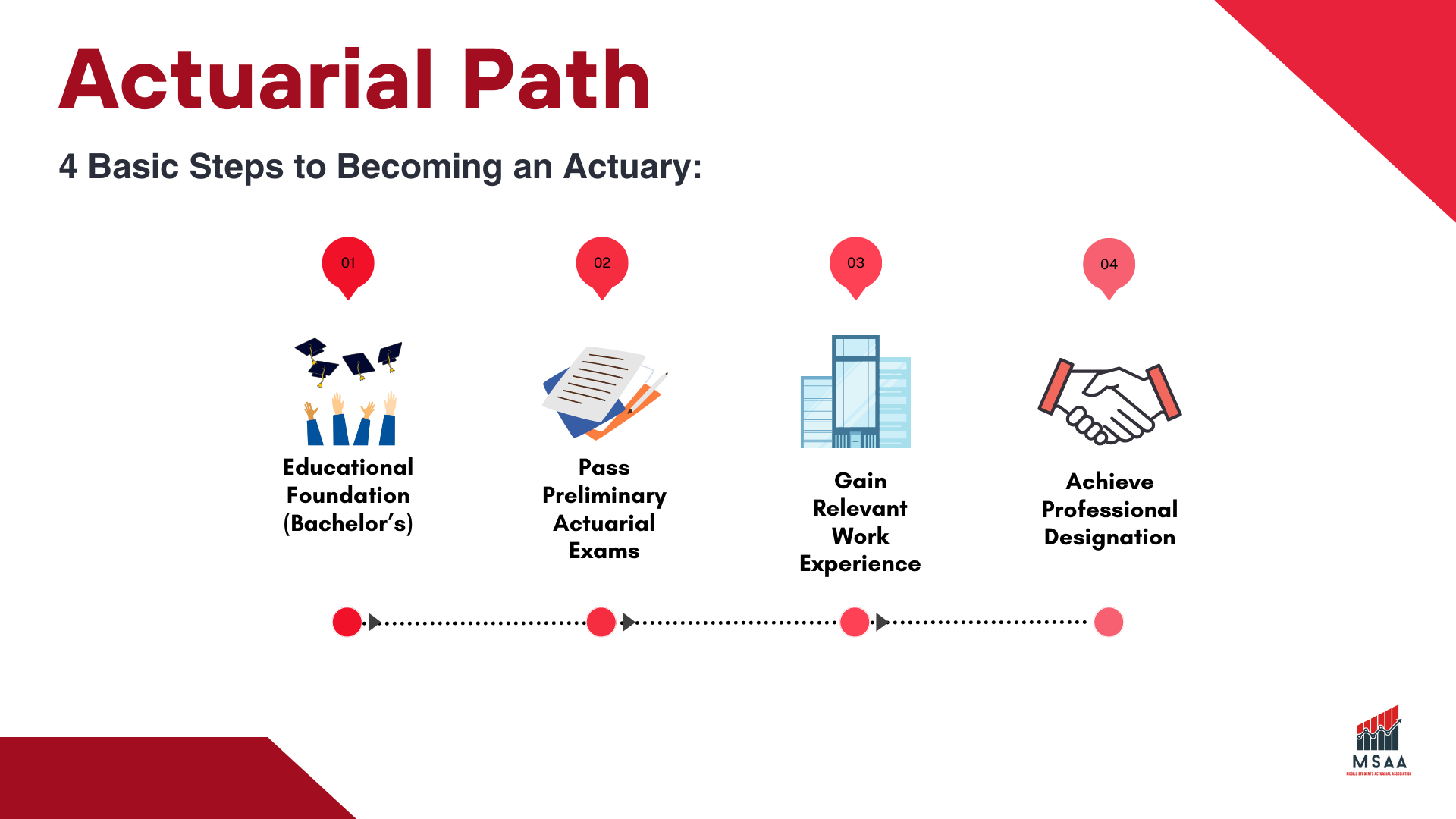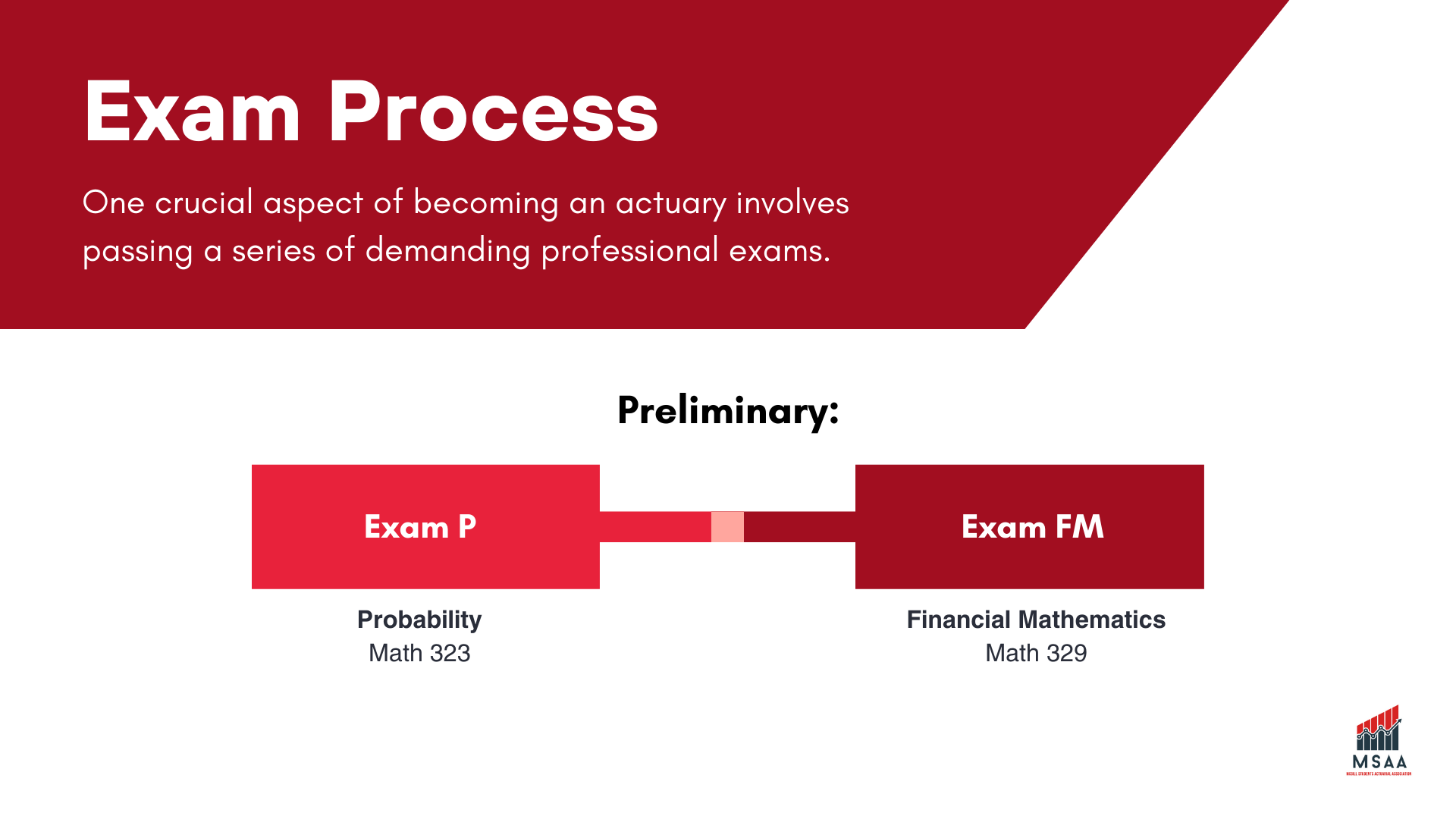Actuarial Science at McGill
Learn more about Actuarial Science at McGill and how MSAA can support you throughout your academic journey!
In North America, accreditation as an actuary is obtained through the Society of Actuaries (SOA) or the Casualty Actuarial Society (CAS). Students interested in becoming an actuary need to complete the various components of the requirements for an Associate of the Society of Actuaries by passing the different Society’s exams.

How do I become an actuary at McGill?
Many universities in Canada offer an actuarial science program that is designed to prepare students for a career as an actuary, but it is not necessary to complete such a program to be an actuary. Anyone, regardless of their educational background, can become an actuary.
You first need to become an Associate, and then you can go on to get your Fellowship. To do so, you need to complete a series of exams given by the Society of Actuaries (SOA) or by the Casualty Actuarial Society (CAS) and certain courses.
Does McGill have an Actuarial Science program?
McGill University does not currently have a dedicated actuarial science program. However, we offer specializations in various faculties which can provide the requisite mathematical training to help prospective actuaries prepare for their examinations. Most members of MSAA study mathematics at McGill, or are enrolled in a program with a significant quantitative component, such as economics or finance. If you are uncertain of which particular program would work best for you, we recommend that you consult an academic advisor.
We can also provide general advice based on our own personal experiences, but note that these would be only suggestions, and we cannot advise students in any official capacity.
What courses should I take to prepare for actuarial exams?
The table below shows the list of preliminary exams and their corresponding courses at McGill that will help with your preparation. Please note that these courses do not cover 100% of the material on the preliminary exams; we recommend that you seek extra practice, preferably using one of the recommended study manuals.
The McGill Students’ Actuarial Association provides academic support in the form of exam resources and tips, and we are currently working on organizing study groups sessions for exam P and FM.

How do I gain my validation by educational experience (VEE) ?
Students will also be able to complete the Validation by Educational Experience (VEE) during their undergraduate degree at McGill. Although these courses may not all be included in one particular major, you can either choose a minor which covers the remaining material, or take the remaining courses as electives.
The table below shows suggested course sequences to complete the VEEs. Note that a grade of B- or higher is required for any given course to be counted as a VEE. Some VEEs may have multiple components; both must be completed before the VEE will be granted. Some courses listed below are offered by the School of Continuing Studies (SCS); special permission is required to enroll in these courses.
| Applied Statistical Methods (requires both regression and time series components) | Economics (requires both microeconomics and macroeconomics component) | Corporate Finance |
|---|---|---|
| MATH 423: Regression and Analysis of Variance (Regression Only) | ECON 208: Microeconomic Analysis and Applications (Microeconomics Only) | MGCR 341: Introduction to Finance AND FINE 342: Corporate Finance (both must be taken for VEE) |
| ECON 337: Introductory Econometrics 1 (Regression Only) | ECON 230 D1/D2: Microeconomic Theory (Microeconomics Only) | CFIN 512: Corporate Finance (offered by School of Continuing Studies) |
| ECON 468: Honours Econometrics 1 (Regression Only) | ECON 250 D1/D2: Honours Introduction to Economic Theory (Microeconomics Only) | |
| ECON 338: Introductory Econometrics 2 (Time Series Only) | MGCR 293: Managerial Economics (Microeconomics Only) | |
| ECON 469: Honours Econometrics 2 (Time Series Only) | ECON 209: Macroeconomic Analysis and Applications (Macroeconomics Only) | |
| MATH 545: Introduction to Time Series Analysis (Time Series Only)* | ECON 330 D1/D2: Macroeconomic Theory (Macroeconomics Only) | |
| MGSC 372: Applied Management Statistics (Both Components) | ECON 352 D1/D2: Honours Macroeconomics (Macroeconomics Only) | |
| CMS2 521: Applied Management Statistics (Both components; offered by SCS) | ECON 295: Macroeconomic Policy (Macroeconomics Only) | |
| CEC2 532: Business Economics (Both components; offered by SCS) |
*Not reliably offered every academic year. Make sure to consult McGill’s eCalendar for degree requirements and course availability.
All information above was adapted from this directory.
